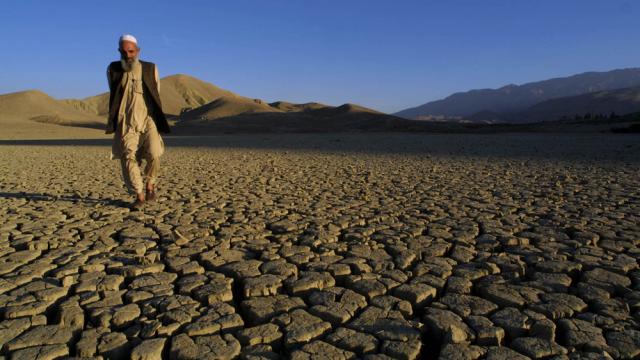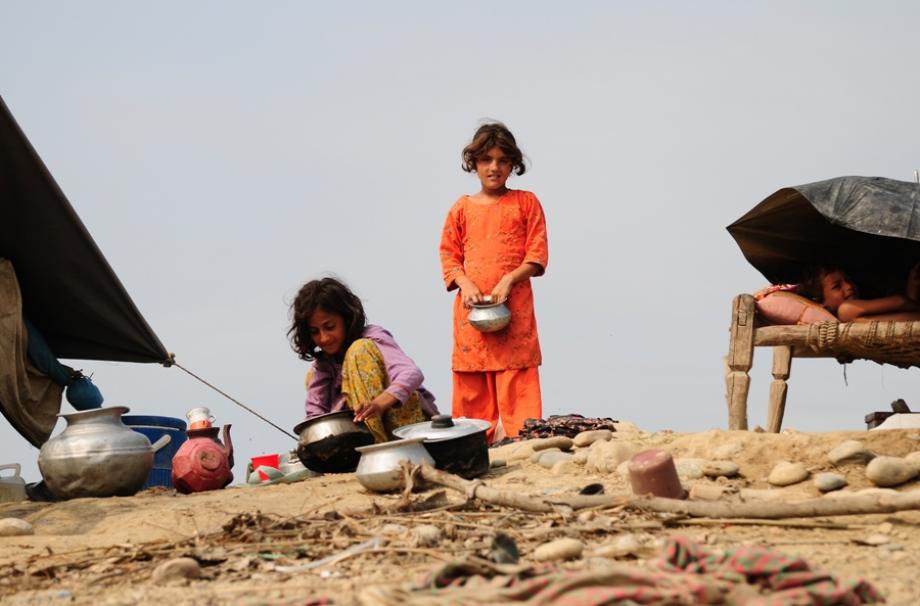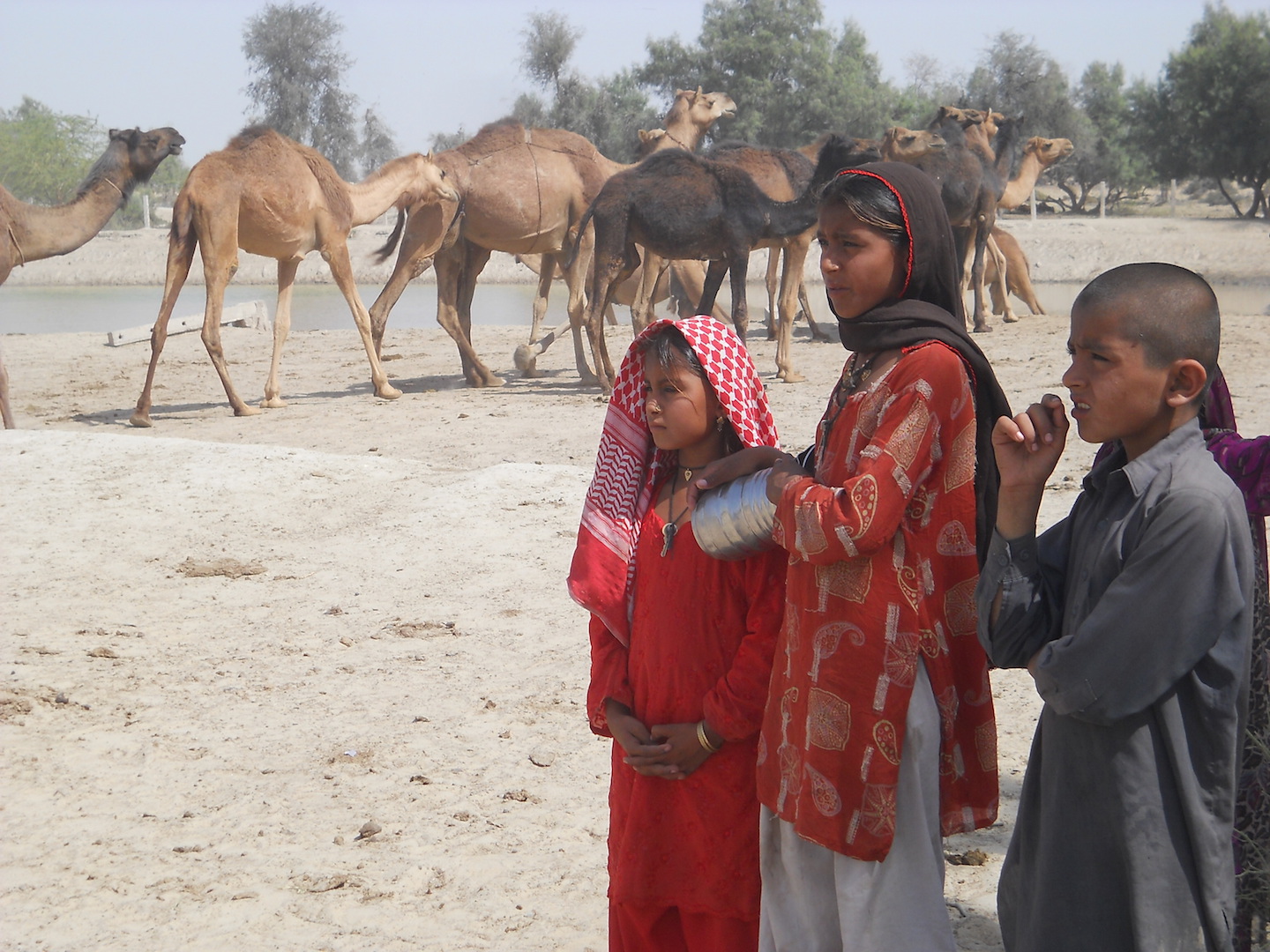
PESHAWAR, Pakistan — As scientists confirm that 2016 was the hottest year on record, global warming is coming down especially hard on Pakistan which is facing an El Niño-spawned dry spell that has badly affected crop production across the country.
Owing to less-than-average rainfall in the current winter season, water shortage has affected the country's wheat, maize, peanut and fruit crops, creating widespread fear of food shortage. “If this situation continues, the farmers will lose everything,” said Atlas Khan, a 50-year-old farmer from Nowshera, in Khyber Pakhtunkhwa province.
Khan's potato crop, spread over several acres, is visibly stunted and wilting due to lack of water. “My potato production will be less than half this season,” he said, and he was also unable to sow wheat last year because the soil was too dry to grow the seeds.
Agriculture contributes about 25 percent of Pakistan's annual GDP and is a major employment sector. But it is increasingly coming under threat from climatic changes of varying kinds. The country is already water stressed, with Pakistan's average rainfall in its wettest months shrinking to around 25.5 centimeters, much less than the amount needed to continue previous levels of farming.
Rainfall is the country’s primary source of water, especially the monsoon rains that typically fall from June to August. But in 2016, Pakistan saw almost no rain at all during monsoon season. Snowfall on the Himalayas provides another major source of water, but the capacity of water storage reservoirs is so weak that hardly enough water is stored to last the whole season.
Experts are of the view that the lack of rainfall is part of changing trends in the region that are likely to intensify in the coming decades because of warming caused by human greenhouse gas emissions. The country’s carbon emissions are growing by 3.9 percent annually, though the World Resources Institute reports that Pakistan's contribution to global greenhouse gas emissions amounts to just .7 percent of the world total.
“There has been an increase in heat that has negative impacts on crops on other species,” said Zubair Ali, deputy director of the Directorate of Fisheries in Khyber-Pakhtunkhwa. Ali has been investigating the mysterious deaths of fish in the Swat River, which he believes are due to the unusual increase in temperature over the last several years.
“During the last three years, there has been an increase of almost 4 degrees Celsius in Swat, a scenic valley in Pakistan,” said Ali, who obtained the results by analyzing daily temperature data from 2003 to 2016, taken at the Pakistan Metrological Observatory Center in Swat.
Ali added that the increase in temperature creates a suitable environment for bacteria known as “flavobocterium columnaris” in Shizothorax fish species. The fish infected from this disease become a target of other diseases, while other species in the river are also affected.
He added that the rising temperature coupled with pollutants – including the direct discharge of municipal waste, industrial effluents, and pesticides from crops – have formed a safe haven for a variety of parasites that could affect the long-term production of crops. “This sickness of fish is an indicator of the worst climatic changes occurring in the region,” he said, and “will have negative impacts on many sectors, in particular food, water and energy.”
The Global Climate Risk Assessment index ranked Pakistan 5th among 10 countries most vulnerable to climate change, due to low rainfall in 2014 that threatened food security while heavy monsoon rains and floods caused 367 deaths, and affected more than 2.5 million people. The rains also destroyed nearly 130,000 houses and more than 1 million acres of cropland across the country.
Another study by the World Bank estimated that 30 percent of Pakistan's current water reserves will be depleted within 20 years. Climate models suggest that overall rainfall should increase in the coming decades, but the region can expect longer dry spells and more intense downpours – forces that would seem to cancel each other out, but which in fact pose new threats.
The Climate Change Centre at the University of Agriculture in Peshawar recently conducted research showing that the region will face acute crop failures due to temperature increase. Studying temperature anomalies experienced in the region between 1960 and 2014, the researchers found that the increase in temperature was between 0.46 and 0.69 degrees Celsius.
“An increase of just one degree Celsius in temperature would cause a rapid increase in the population of insects with devastating effects on agriculture,” said Dr. Inam Ullah, who is leading the research work. “The wheat crop will be in most danger by 2060 while maize would not be able to grow by 2080.” Ullah added that with temperatures increasing faster now than in the past, farmers must prepare by devising new heat-resistant seeds that require less water, as well as pesticides to counter insects.
Shahbaz Sharif, the chief minister of Punjab province, which is known as "the food basket of the country" due to its output of grain, has warned that Punjab's underground water level is decreasing by four to five feet each year. The water can currently be accessed only as far down as 800 feet. Meanwhile, officials studying the Indus River say the water system's two main reservoirs, Mangla and Turbela, will reach a dead level in February if the country fails to receive sufficient rains.
The farmer Atlas Khan and others in his village said their problems were heightened last season because, with unusually little rainfall, the irrigation wasn't powerful enough coming out of the pipes. “What he needed most was water," Khan said, reflecting the anxieties shared by many of his countrymen who have been working the same piece of land over generations. "We expect little to no return from our crops this year, while we also failed to arrange sufficient fodder for livestock.”
Recently, hundreds gathered at Chowk Yadgar, the "Square of Remembrance,” in Peshawar to offer prayers for rain. They prayed to Allah, while keeping their hands toward the sky.
“We will keep looking up, hoping rain will rejuvenate our agriculture fields,” said Khan. Since the beginning of the new year, the sky has been gray, tantalizing him with hints of rain. At one point it looked like Khan and his companions’ prayers might be answered, but he keeps waiting. And his wheat and potato crops continue in pressing need of water.
3 WAYS TO SHOW YOUR SUPPORT
- Log in to post comments

















